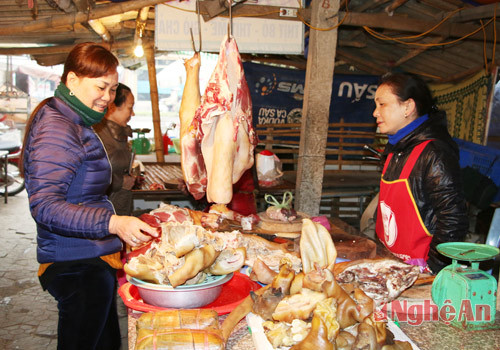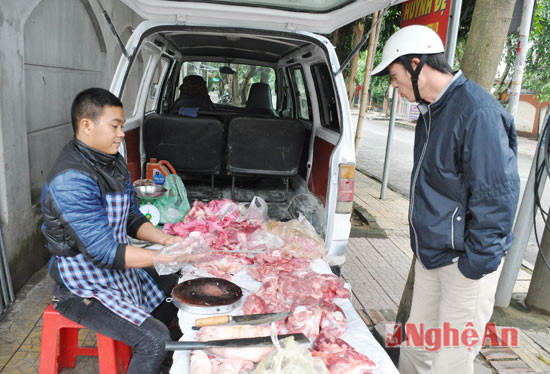Developing clean food from clean livestock
(Baonghean) - In the context of food containing harmful chemicals being rampant, consumers from cities to rural areas are finding many ways to "hunt" for clean food.
Demand for clean meat is increasing sharply
Every time, when Mrs. Nguyen Thi Lam's house in Van Tien block, Hung Dung ward (Vinh city) was preparing to slaughter a pig, the people around her whispered to each other to prepare to go buy it. Ms. Vu Thi Giang - a teacher in Do Luong, who lives next to Mrs. Lam before going to teach, could not go buy it so she asked her neighbor to get it for her. Ms. Giang said, I am very worried about buying floating meat, using feed mixed with banned substances, uncontrolled additives. Therefore, every time I have a pig from my hometown, I buy a lot to store in the refrigerator for later use.
Not only Ms. Giang, but many people, upon hearing the news of pork raised with garbage water (using leftover food, not using chemical growth-enhancing feed), woke up early to wait their turn to buy. Many consumers, when asked, said that the price of clean pork is often higher because it does not use super-lean ingredients, the fat content is higher, so the price is higher, but this product helps them avoid worries about food hygiene and safety. Therefore, Mrs. Lam's family never has unsold pigs when slaughtering pigs several times a year.
 |
| According to a survey by the Food and Agriculture Organization of the United Nations (FAO), Vietnamese people like to eat pork. The Vietnamese menu usually consists of 73.3% pork, 17.5% poultry and 9.2% red meat. Photo QL |
Pork is the main ingredient in every family meal, so information about pigs raised with growth stimulants, beef injected with water to increase weight, or dirty, spoiled meat enchanted with chemicals, bleach... makes housewives find all kinds of ways to "hunt" for clean food. Many people have returned to their hometowns to order, even raising chickens and pigs in the countryside to create a supply for daily meals. And also because of concerns about dirty food, it is not difficult to find rural food stores in the alleys. Thanks to the guidance of relatives, Mr. Thanh and his wife in Dong Van (Thanh Chuong) after their free time went to Vinh to do business. Every day, the couple looks for clean sources of goods, getting up at 2am to butcher pork, chicken, and beef, and at 5am transporting the goods to sell on Hermann Gmeiner Street (Vinh City). It is hard work, but his goods are in high demand every day.
Seeing the increasing demand for clean rural food among city dwellers, while the supply of goods from acquaintances is not always available, he has employed his family members who specialize in collecting goods in and outside the commune to find sources of supply. To serve the sales, he recently bought a car to transport goods; from poverty, his family built a spacious 3-storey house in the countryside. Mr. Thanh said that the number of regular customers is increasing, no matter how much goods are sold, they have to go to remote areas to find sources of goods. Here, people raising their own chickens and pigs is not uncommon and is also guaranteed to be clean, and the farmers do not use growth-enhancing feed.
Livestock farming according to VietGAHP is inevitable
Currently, in addition to clean meat raised on a small scale among the people, VietGAHP-oriented farm raising is also being implemented. Mr. Luu Cong Hoa - Head of the Animal Husbandry Department, Department of Agriculture and Rural Development said: For a long time, consumers have been hesitant about farm-raised livestock products without knowing that farm-raised livestock using industrial feed is a scientific and technical advancement, livestock are fed industrial feed with sufficient ingredients, ensuring nutrition. This feed is researched to suit each subject and each type, but the current price is higher.
Livestock products registered with good animal husbandry practices, farms, and households can all be considered clean products. Fortunately, recently, with financial and technical support from the livestock industry competition project, many households have begun to cooperate with businesses and cooperatives, applying new processes, ensuring the supply of clean meat products to the market.
 |
| Mr. Thanh's butcher shop (Dong Van, Thanh Chuong) on SOS street, Vinh city |
The integrated livestock farm of Mr. Tran Van Nam's family in Hamlet 2A, Nam Thanh Commune (Nam Dan) is well known to many people. With over 150 pigs, 10 cows and nearly 2,000 chickens, Mr. Nam participated in the VietGAHP livestock program right from the beginning of the project in Nam Thanh.
Thanks to strictly following the strict farming procedures, his family's products have built up a reputation among consumers in recent years. Traders from the districts and Vinh City come to pick up the products directly from the farm, so they almost do not have to sell them. In addition to buying the source of food from factories in the province, the family's livestock products are not only clean but also reduce costs and achieve higher efficiency.
“VietGAHP products are gradually gaining people’s trust, however, the quantity is not much, the propaganda is not good, so currently they are still mixed with traditional pigs, raised without following the process and using a lot of chemicals. In the future, if there is the participation of businesses with large-scale chain farming models, these difficulties can be resolved,” Mr. Nam shared.
According to research, recently housewives tend to switch to buying meat, vegetables, tubers, and fruits in supermarkets and stores specializing in clean food grown according to VietGAHP processes with clear origins. Ms. Dang Thi Tam - Director of Phu Dien APG Joint Stock Company said: Currently, consumers are starting to pay more attention to quality assessment standards as well as the origin of food. Therefore, chicken, pork, vegetables, tubers, and fruits grown with good production practice certification such as VietGAHP are trusted by consumers as clean and safe for health.
Livestock farming according to VietGAHP process not only enhances the competitiveness of livestock households through improving productivity, quality, and food safety, but also reduces environmental pollution in the livestock product chain towards clean livestock farming from farm to table. Clean livestock farming is not only a market requirement but also a vital factor for the Vietnamese livestock industry in the face of pressure from imported meat from countries with developed livestock farming and good food safety management processes as Vietnam integrates more and more deeply into world economic organizations.
Thu Huyen
| RELATED NEWS |
|---|


